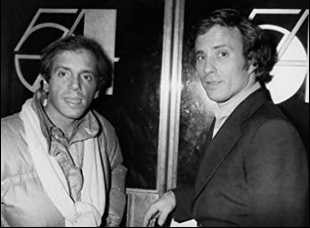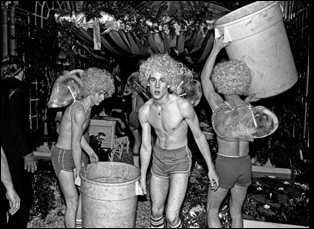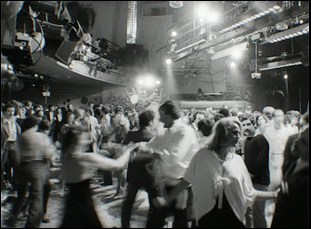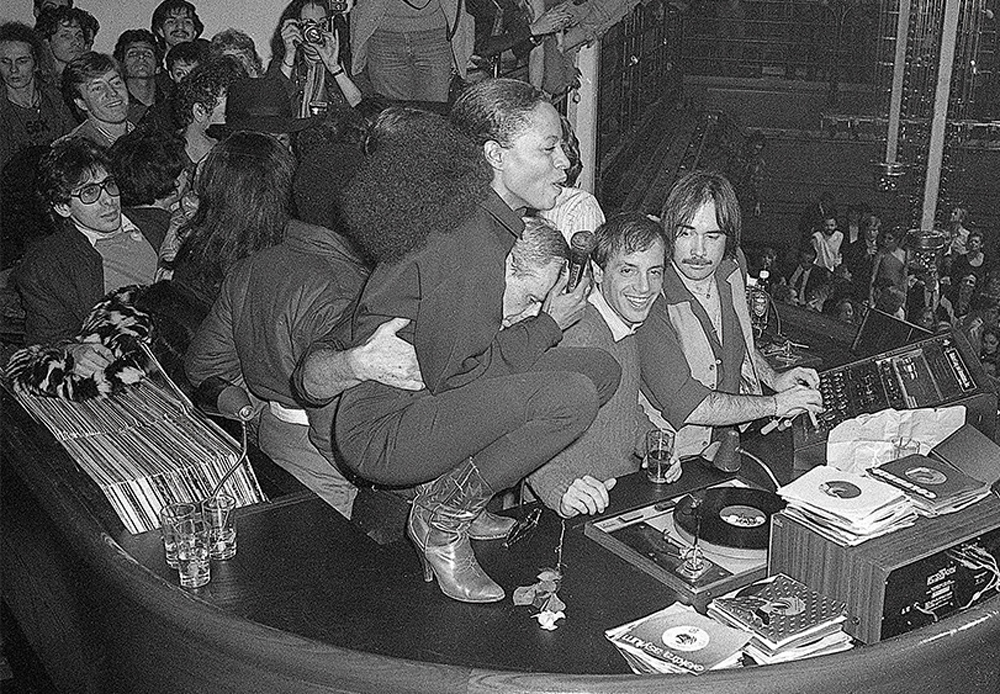“In a club, it’s all about capturing a moment,” Steve Rubell can be heard saying in a slightly scratchy recording at the start of “Studio 54,” a film named for the legendary New York hotspot he created with Ian Schrager in the late 1970s. While the two created a club where the ambiance could change every night to keep the interest of the many celebrities deemed famous enough to be let in, it becomes the burden of filmmaker Matt Tyrnauer to convey exactly what was special about the place, yet he is as wildly successful in his endeavor as Rubell and Schrager were in theirs, with the duo’s ultimate downfall only enriching the Icarus-esque tale of a discotheque so hot it melted their wings.
A confluence of timing and canny planning, it is Tyrnauer’s view that Studio 54 was a unique bastion of freedom situated just after the end of the Vietnam War and before the AIDS crisis when fun free of consequence was actually possible and Rubell and Schrager put themselves in position to provide it, going against some trends in the city such as picking the then-seedy Times Square for a locale while embracing others, such as disco music and an open environment more commonly associated with gay clubs, to create the top place for nightlife, attracting Liza Minnelli and Michael Jackson as regulars. Tyrnauer, who in recent years has shifted his engaging profiles from the pages of Vanity Fair to the big screen as of late with films about Valentino, urban activist Jane Jacobs (“Citizen Jane”) and hustler to the stars Scotty Bowers (“Scotty and the Secret History of Hollywood”), simultaneously summons the excitement around Studio 54 while putting it into a larger context, showing how Rubell and Schrager’s fetishization of the velvet ropes that kept much of the public at arm’s length from the club helped usher in the age of celebrity and created capital out of cultural cache alone.
Neither Rubell, who passed away from complications related to AIDS in 1989, or Schrager, who since went on to become a very successful international hotelier, ever spoke at length, if at all about Studio 54 after its meteoric three-year run, primarily because the two received prison time for tax evasion. But with Schrager onboard to tell the story warts and all to Tyrnauer, as well as other key figures in the club’s operations from silent partner Jack Dushey to doorman Marc Benecke, you come to understand the alchemy involved to concoct such a fantastical place and what ill can come when those involved start confusing the fiction they’ve created with reality. During a rare break for the filmmaker who has seen the release of three films within the past 18 months, Tyrnauer spoke about how a casual conversation led to the full-fledged history of the near-mythic club, the storylines he had to abandon for time and how discovering the truth about Studio 54 separated it from previous depictions of the era and the scene.

Ian Schrager is someone I’ve known for a while [from] when I did a Vanity Fair story about the Delano Hotel and I have always been in touch with him because we have a mutual interest in architecture and design. I was talking with him a little over two years ago and he said to me, “Do you think a movie about Studio 54 is a good idea?” He had never talked about it before, and I said, “Well, if you talk, I think it’s a great idea.” And he said, “I’ve been thinking about it. My kids are older now and I think I should tell them about it. I’m ready to talk.” And then the next thing he said to me was, “What about jail?” And I said, “Well, if there’s no [talk about] jail, there’s no movie.” And then he agreed to tell me the full story.
When he approaches you in that way, were you and him on the same page from the start about what this would be or could you take ownership of it?
I have final cut on all my films, so I definitely took ownership and I told him what I had in mind, but I didn’t really check in with him. Much like my first film “Valentino,” I think they thought I was making a movie that was very different from the one I wanted to make. Their perception of their story was very different from mine, but that’s the whole point. The point is that if you’re making a film that is from the subject’s perspective and driven by the subject, it’s a very different movie or not a movie at all. This is my take on the era and I picked what was important in my mind, which was the partnership story of Rubell and Schrager. It’s been 40 years since Studio and the sex, drugs take on Studio has been told or if it hasn’t, you can tell it in one sentence. That’s a reason the movie isn’t driven by celebrity interviews because, how interesting would they really be? I wanted to give the deep dive of the club to reassess its deeper meaning a couple generations after it happened.
That does mean some hazy memories to work through, given what was going on at the time?
Hazy memory is one thing and being dead’s another, frankly, and it’s one of the real gutwrenching truths about Studio is that so many of its primary constituents died for one reason or another [with] a principal reason being the HIV/AIDS crisis. It was almost unbearably sad to realize how many people are gone because of that, but that is a fundamental part of the story. In addition to that, it was a very druggy place and many people had addiction problems, so many people did have very foggy memories. But there are enough people that don’t and are fully cognizant of what happened, Schrager being one of them. He is a canny observer and still very much was aware of what his story was and could tell it with perfect clarity. The people we went to discuss other aspects of the club, there certainly were enough of them who were there and had great recall, so I think you get a mosaic portrait that is as accurate that has ever been done.
With Ian, it seems both his visits to Studio 54 now, since refurbished as a Broadway theater, and his meeting with Jack, the silent partner along with he and Steve, really enliven him. What was it like to set those things up?
I didn’t know about Jack. No one did really unless you were really reading the papers closely at the time, so when I was debriefing [Ian] initially on who the characters were [that I wanted to follow], he said he was still in touch with [Jack], which is remarkable because Jack turned him in. He was the money partner, he turned state’s evidence and implicated Rubell and Schrager and they went to prison directly because of Jack’s testimony. And I thought the fact that Ian and Jack still speak and are on good terms is a testament to the human spirit for forgiveness. So [Ian] set up that interview with Jack and that’s very special [especially because] Jack never talked before either. In terms of going back to Studio, [Ian] was willing to do that, but he really hadn’t been back since he left the day of the final party, so that was a big deal, just seeing him in that space and reliving this on camera. And that’s part of the magic of film. You get to be there with Ian whereas if it was a newspaper article or a magazine article, which I used to write, you’re describing him in this space, and that’s good too, but it’s amazing [to see] the real guy coming back and you can read his expressions and his demeanor.

Many. You could’ve done five hours. You could’ve done funk and the underground club scene [before Studio 54] and then the demise of disco and then you could’ve done hip hop. Studio is part of a larger ecosystem of nightclubs and music from the era and certainly the story of New York in the late ‘70s as well, so I chose [to focus on] this particular duo that created something that had never been created before and they lost it. That for me is a 90-minute movie, but we did a deeper dive in one edit of the precursor nightclubs and a little more on gay nightlife in New York, which I thought was fascinating because Studio, while not nominally a gay club, [has] certainly part of its DNA come from the gay club scene, which was underground at the time. And disco [was] African-American underground funk-related form of dance music that the gay population and the nightclub scene adopted and promoted — that’s a niche film on its own. So I explored that, and a lot of that ended up on the cutting room floor, but that’s the story with every 90-minute film. You throw away perfectly great sequences that don’t propel you through the story in a timely way.
What was it like to work on the music? You manage to get that energy and the feeling of the era without resorting to the standards, it seems.
First of all, I’m not a disco aficionado. I never was and I never will be. [laughs] But there were two things I knew I wanted — I wanted the score to be complementary to the disco music, but not to be disco itself and I wanted all of the disco music to be authentic to the period, songs that were played in the club to the appropriate years and I didn’t want it to be the most obvious, so for instance, “I Will Survive” is probably the greatest anthem of the disco era, but it’s not in the film. It was almost too on the nose, so we chose other songs with the help of a music supervisor and also interviewing DJs who were instrumental, such as Jellybean Benitez, to really guide what would ultimately be the musicscape of the film.
Did Schrager actually have a pretty thorough archive or did you have to go on a treasure hunt for a lot of the photographs and other material to illustrate the story?
A bit of both. He had the scrapbooks, which are in the film at the beginning, and also dozens of cardboard boxes full with clips from newspapers [from] clipping services that you would pay [in those days]. [ian] told me he and Steve each got a clip of every article that they would send to you in an envelope and then they threw them in boxes, so there were thousands and thousands of boxes of these clips that hadn’t been touched and we went through all of those. In terms of photographs, the photographers had all of those, so we looked at probably more than 100,000 images on contact sheets and negatives and I chose the ones that had not been seen before for the most part.
Sorting through all that, does it tell you a different story than the one you may have had in your head?
You change your perspective on it all the way through because you learn things. Certain things make sense that didn’t make sense before. I’ll try to give you an example — I always heard there was sex in the bathrooms, but I never knew where the bathrooms were, so when we toured the club and we saw where they were, you could see why that would make sense. They were in this mezzanine and there was a bar outside of it. It was a little quieter and the music wouldn’t be as loud. It was a place you could retreat to within the club. Because I had never been in Studio — I was in the second grade when it was going on – part of my job as a filmmaker was to explain to people that hadn’t been there what it had been like to be immersed in this space, so we do that through montage, but also literal blueprints from the construction of the club – I got those and I had them animated by a graphic designer so you can see how they built the club in the combination of photo, film and animated blueprints.

It’s just the movie juju. ”Scotty” was a three-and-a-half, four year project. It’s a verite film, which takes a year to edit. They just move much slower than docs that are archivally-driven. “Studio” is a hybrid of verite and archival and the way the financing and the schedules shook out they were both ready in the same calendar year and the distributors calendared them in this year. I’ve been called prolific – I’ll take it. I’m just working as fast as I can on all my projects and they happen when they happen.
It’s been interesting, at least from my end, to see how these films covering the past have had so much to say about our present moment. Is that something you’ve felt as you’re putting them out there?
Yeah, it’s interesting In terms of “Citizen Jane,” it was a film that I was finishing as Hillary was running for president and I fully expected her to win. It had its world premiere two days after the election, so I was expecting to premiere a movie about a brilliant female activist who was ahead of her time and a visionary – I expected to have its New York City premiere in the wake of the election of the first female president and boy was I surprised. The movie still is about a brilliant woman who is going up against a a self-styled master builder [in Robert Moses], so there were shades of Hillary/Trump there and people have read the movie that way, not inappropriately, but certainly I didn’t have that in mind when I was making it.
In terms of “Studio,” it’s about a moment in time that was deeply political, the post-Vietnam era and it’s about a character [in Ian] who rose to the highest heights and then faced enormous challenges and has to be contrite and not ask for forgiveness, but in order to be a sympathetic character, express regret – which he does. That’s not something I had to pull out of him and he talks about it in an extraordinary way. But what a contrast to the week it premiered where we had Brett Kavanaugh hearings happening. You have this white, privileged male creating the biggest public display of anti-contrition that I’ve ever seen, not owning up to anything, and getting away with it, so it’s fascinating to me how the week that you show it, the season that you premiere it or whenever you happen to see it, the audience’s perception of a film can shift. But that is one of the beauties of filmmaking. When you show these [theatrically] to audiences, you get a different vibration from it than watching it on your wristwatch or TV, so every film I’ve made has been theatrical, which is something I’m really proud of and I hope to be able to continue.
“Studio 54” is now open in Los Angeles at the Nuart Theater and in San Francisco at the Embarcadero Center. A full schedule of theaters and dates is here.




